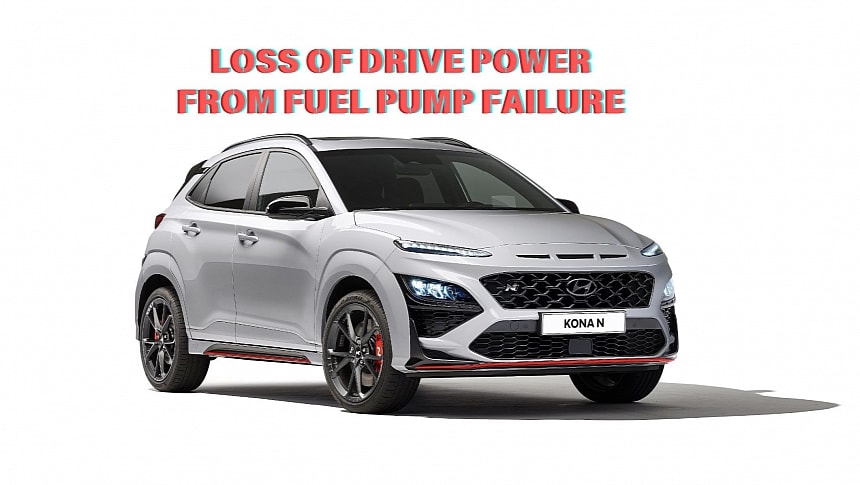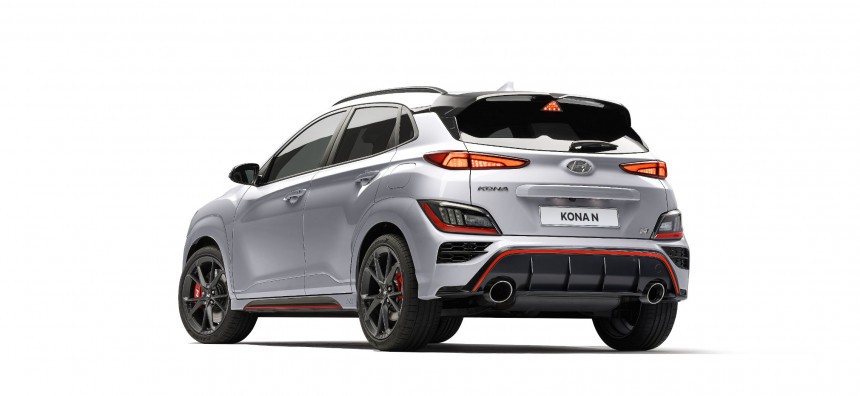Hyundai Motor America recall numbers 262 and 023G concern high-performance vehicles from Hyundai and certain examples of the Genesis G70 luxury sedan. According to documents filed with the National Highway Traffic Safety Administration, the fuel control valve in the high-pressure fuel pump could allow excess dinosaur juice to enter the fuel pump.
How come? Turns out the fuel control valve plunger may wear prematurely. Excess fuel in the fuel pump will result in a rich air/fuel mixture, leading to a reduction or – in the worst-case scenario – complete loss of motive power. A worn fuel control valve plunger also results in rough idling and a misfiring engine.
The high-pressure fuel pump assemblies were supplied by the Motonic Corporation of South Korea under three part numbers. 35320-2GHA1 is for the Kona N, Veloster N, and Elantra N, while 35320-2CTB0 and 35320-2CTB1 are for the Genesis brand's G70 sedan.
Back in July 2023, the Hyundai Motor Company informed Hyundai Motor America of an investigation prompted by reports of loss of motive power. The preliminary findings noted a fault code indicating a rich air/fuel condition, prompting the automaker to recover fuel pumps from the field for in-depth analysis.
In January 2024, the Korea Apparel Testing & Research Institute started asking question due to complaints involving the Genesis G70. The Hyundai Motor Company had collected 46 fuel pumps for testing by the end of March 2024, split between 27 from the US market and 19 from the South Korean market. Following a successful replication test, the automaker determined that diagnostic trouble code P0088 makes the vehicle enter limp mode, limiting acceleration after 60 miles per hour (97 kilometers per hour).
Additional testing and reviews led to the aforementioned recalls for the US market, which comprises 2.0-liter turbo I4 vehicles exclusively. To date, Hyundai Motor America is aware of 2,460 related incident reports in the US, with said reports dated May 2019 to June 2024.
Thankfully for the automaker's legal team and the affected customers, there are no crashes or injuries related to this concern. The Genesis G70 is listed with production dates of May 2018 to October 2023 for the 2019 through 2023 model years, followed by September 2018 to August 2022 for the 2019 to 2022 Veloster N.
Elantra N and Kona N vehicles, meanwhile, are listed under the 2022 and 2023 model years, with production dates ranging from September 2021 to November 2023 and October 2021 to April 2023, respectively. As you might have guessed by now, the remedy is a high-pressure fuel pump with an improved fuel control valve plunger.
Dealers are further required to update the engine control module, although Hyundai did not explain the role of this update in documents published via the National Highway Traffic Safety Administration's portal. Owner notifications will be mailed beginning September 9, 2024.
The high-pressure fuel pump assemblies were supplied by the Motonic Corporation of South Korea under three part numbers. 35320-2GHA1 is for the Kona N, Veloster N, and Elantra N, while 35320-2CTB0 and 35320-2CTB1 are for the Genesis brand's G70 sedan.
Back in July 2023, the Hyundai Motor Company informed Hyundai Motor America of an investigation prompted by reports of loss of motive power. The preliminary findings noted a fault code indicating a rich air/fuel condition, prompting the automaker to recover fuel pumps from the field for in-depth analysis.
In January 2024, the Korea Apparel Testing & Research Institute started asking question due to complaints involving the Genesis G70. The Hyundai Motor Company had collected 46 fuel pumps for testing by the end of March 2024, split between 27 from the US market and 19 from the South Korean market. Following a successful replication test, the automaker determined that diagnostic trouble code P0088 makes the vehicle enter limp mode, limiting acceleration after 60 miles per hour (97 kilometers per hour).
Thankfully for the automaker's legal team and the affected customers, there are no crashes or injuries related to this concern. The Genesis G70 is listed with production dates of May 2018 to October 2023 for the 2019 through 2023 model years, followed by September 2018 to August 2022 for the 2019 to 2022 Veloster N.
Elantra N and Kona N vehicles, meanwhile, are listed under the 2022 and 2023 model years, with production dates ranging from September 2021 to November 2023 and October 2021 to April 2023, respectively. As you might have guessed by now, the remedy is a high-pressure fuel pump with an improved fuel control valve plunger.
Dealers are further required to update the engine control module, although Hyundai did not explain the role of this update in documents published via the National Highway Traffic Safety Administration's portal. Owner notifications will be mailed beginning September 9, 2024.














